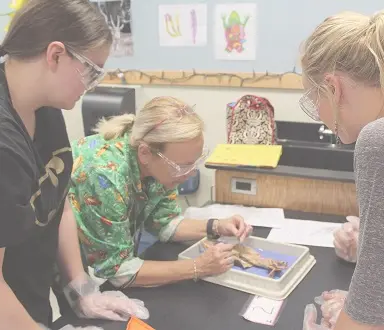Being a gifted child can be difficult. Gifted children often feel misunderstood by their peers and possibly don’t even fully comprehend themselves and their abilities. This can lead to low self-esteem or self-doubt, hindering a child from thriving in school and reaching their full potential.
This is where a role model in the form of a mentor can be beneficial to a gifted child. Mentors allow children trying to understand their unique gifts and talents an avenue to share interests, passions, thoughts and doubts in a constructive, supportive space. According to Sandra Berger in her article “Mentor relationships and gifted learners”:
One of the most valuable experiences a gifted student can have is exposure to a mentor who is willing to share personal values, a particular interest, time, talents, and skills. When the experience is properly structured and the mentor is a good match for the student, the relationship can provide both mentor and student with encouragement, inspiration, new insights, and other personal rewards.
For gifted children, the potential benefits of a committed mentor are numerous and can contribute to both short and long-term success. Berger notes that parents often notice mentors have a “maturing effect” in helping students narrow down their many talents and interests into focused educational and career goals.
Some questions to ask when considering mentoring for your child:
- What are their goals and interests?
Whether it’s learning a new skill, emotional support or academic assistance, mentoring covers a wide-range of areas. Talk with your child about what they are looking to get out of a mentoring relationship and what will make them feel most supported. - Does your child understand the role of a mentor?
Ensure your child understands the mentor is not a friend or parent. Explain the limitations and expectations of the relationship, both for them and for their mentor. - Is your child committed to spending time with the mentor?
Some children think they are ready for a mentor, but are then disappointed with the time it takes out of an otherwise free period they could be exploring other interests. Set clear and realistic expectations for both the mentor and the child.
If you have determined a mentor is right for your child, the Davidson Institute for Talent Development has published helpful tips on finding a mentor.
Additionally, IEA EXPLORE offers high-potential secondary students externship opportunities where they can receive mentorship from distinguished professionals and gain hands-on experience in a field of their interest.
Each externship is custom-designed so students grow intellectually and personally, while making pertinent and lasting connections with their mentors and peers.
Visit our site to apply today!
Like this post? Sign up for our email newsletter to receive more stories, information, and resources about gifted youth straight to your inbox.

